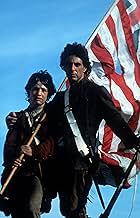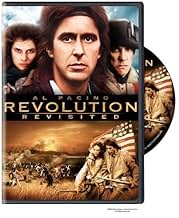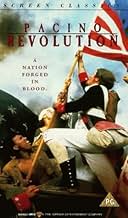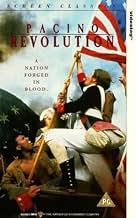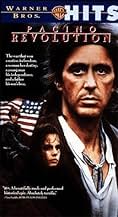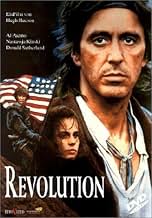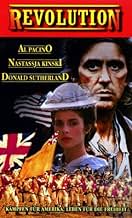IMDb RATING
5.3/10
8K
YOUR RATING
A trapper and his young son get pulled into the American revolution early as unwilling participants and remain involved through to the end.A trapper and his young son get pulled into the American revolution early as unwilling participants and remain involved through to the end.A trapper and his young son get pulled into the American revolution early as unwilling participants and remain involved through to the end.
- Awards
- 1 win & 4 nominations total
Cheryl Anne Miller
- Cuffy
- (as Cheryl Miller)
- Director
- Writer
- All cast & crew
- Production, box office & more at IMDbPro
Featured reviews
I've watched this film several times over the years and was really surprised to learn (after checking it out on IMDB) that is was considered a flop at the time of its release! Also baffled completely by the relatively low rating.
I'm certainly not an expert on this historical timeframe and like most period films, I'm sure they got some things wrong. However, this gritty, grimy film seemed to me, what the time and place must have been like. In other words, it conveys a certain, almost documentary style realism, right down to the rather odd pacing of the film's plot. The film doesn't seem to build to a climatic ending, but rather plays out a slice of life in all its awkwardness. Compared to a film like, "The Patriot" (which contains some pretty outrageous Hollywood stuff), I find this somber film to better represent the period (in my mind).
Oh, I liked Pacino's performance! It isn't over the top. He seems like a regular fellow caught up in extraordinary events. Again, can't understand the overly critical review of his acting here. Ditto for Sutherland and Kinski.
Definitely worth watching if you're looking for something outside of a formula Hollywood "history" movie. I think it will become more highly regarded in its context as time goes on.
I'm certainly not an expert on this historical timeframe and like most period films, I'm sure they got some things wrong. However, this gritty, grimy film seemed to me, what the time and place must have been like. In other words, it conveys a certain, almost documentary style realism, right down to the rather odd pacing of the film's plot. The film doesn't seem to build to a climatic ending, but rather plays out a slice of life in all its awkwardness. Compared to a film like, "The Patriot" (which contains some pretty outrageous Hollywood stuff), I find this somber film to better represent the period (in my mind).
Oh, I liked Pacino's performance! It isn't over the top. He seems like a regular fellow caught up in extraordinary events. Again, can't understand the overly critical review of his acting here. Ditto for Sutherland and Kinski.
Definitely worth watching if you're looking for something outside of a formula Hollywood "history" movie. I think it will become more highly regarded in its context as time goes on.
"Revolution" could have been a fascinating story. Unfortunately, it seems that director Hugh Hudson had shot his entire wad when he made the Oscar-winning "Chariots of Fire". Both "Greystoke" and this film were sloppy, choppy messes with no narrative flow. It is confounding, because it is obvious that there was a lot of attention to detail in parts of "Revolution". But only in parts. There is as much here that simply doesn't fit--the most glaring example being Al Pacino performance as a colonial trapper. He apparently forgot what movie he was in, and frequently uses a halting accent very similar to the one he used only two years earlier in Brian DePalma's "Scarface". And I don't think his character was supposed to be Cuban. The rest of the film produces the same effect you would get from flipping through a beautiful set of American Revolution postcards--at random.
After the Academy Awards, the most important awards ceremony is the Golden Raspberries (known as "Razzies") – the "worst of" counterpart to the Oscars. The thing about the Razzies is that they don't go for the literal worst movies of the year – otherwise they would give prizes to a load of trashy B-movies. Instead they bestow their honours upon the high profile flops, the movies that could have been so much more, the casts and crews who should have known better. Revolution stars Al Pacino, one of the greatest actors of his generation, and was directed by Hugh Hudson, he of 1981 Best Picture Chariots of Fire. And yet, in a stark "Oh how the mighty have fallen" scenario, it recouped less than two percent of its budget at the box office and was nominated for four Golden Raspberries.
Revolution is not without promise. In contrast to the usual gung-ho attitude of pictures on this subject (cf. The Patriot), this takes an approach rare in historical pictures on any era, showing not the makers and shapers of change, but those unwillingly caught up in it. The Robert Dillon screenplay still ultimately comes down on the side of the revolutionaries, but it shows the conflict with the minimum of political emotiveness, and a storyline whose occasional poignancy comes from its even-handed intimacy. Director Hudson has excelled in creating tableaux that are full of believable bustle and period dirt, even if they were entirely shot in rainy England. There's a realistic melange of accents to be heard here; not just clipped British and broad American, which didn't really exist in any recognisable form at the time anyway. The credibility of some of the bit parts is very effective, such as the bolshy soldier who prods Pacino when he's chosen for the fox hunt, a slappable face if ever there was one.
And yet the movie's the biggest flaws are on the same grounds. There are some woefully unrealistic and downright silly characterisations here. Chief among these is Nastassja Kinski's. While no means badly acted (in fact she does very well all things considered), the character as written is in no way believable. Not that you can't have rebellious and resourceful women, but stabbing a man in the nadgers at a soirée is a bit hard to swallow. It would probably have warranted her a stint in an asylum, and certainly more than just a telling off from her mother. And giving the Englishman in question a stupid nasal voice and cartoonish demeanour was a huge mistake. It all seems totally at odds with the realism elsewhere in the movie. There are problems too with the over-earnest attempt at a documentary look. Hudson's constant use of hand-held camera quickly becomes tiresome. Pacino's performance is heartfelt but there are times when he appears to break into improvisation yet comes across too much as the modern New Yorker.
In response to its poor reception, Hudson would later revisit the material for a 2009 special edition appropriately titled Revolution Revisited, and it is this version of the movie which I have seen. Apparently around ten minutes of footage was shorn off (I don't know what this was so can't comment), and they added narration by Pacino, written and recorded ad hoc. This latter was to my mind a mistake – it adds nothing, basically spelling out the character's thoughts at any given moment, even though the essence of them is already there on the screen. It somewhat spoils the taciturn moodiness of the character, as well as the chaotic wordlessness of some scenes. It's nice however to be able to enjoy a decent new transfer of the picture, because it really isn't as bad as its reputation (and those Razzie nominations, all of which it lost to Rambo II, I hasten to add) would suggest. It is incredibly moving at times, a high point being Pacino's desperate comforting of Ned as his foot wound is cauterized. It's also beautifully shot. This is ultimately a movie of two sides – the very good and the very bad, with no middle ground of mediocrity. And this is very frustrating, because you can see just how easily it could have been a masterpiece.
Revolution is not without promise. In contrast to the usual gung-ho attitude of pictures on this subject (cf. The Patriot), this takes an approach rare in historical pictures on any era, showing not the makers and shapers of change, but those unwillingly caught up in it. The Robert Dillon screenplay still ultimately comes down on the side of the revolutionaries, but it shows the conflict with the minimum of political emotiveness, and a storyline whose occasional poignancy comes from its even-handed intimacy. Director Hudson has excelled in creating tableaux that are full of believable bustle and period dirt, even if they were entirely shot in rainy England. There's a realistic melange of accents to be heard here; not just clipped British and broad American, which didn't really exist in any recognisable form at the time anyway. The credibility of some of the bit parts is very effective, such as the bolshy soldier who prods Pacino when he's chosen for the fox hunt, a slappable face if ever there was one.
And yet the movie's the biggest flaws are on the same grounds. There are some woefully unrealistic and downright silly characterisations here. Chief among these is Nastassja Kinski's. While no means badly acted (in fact she does very well all things considered), the character as written is in no way believable. Not that you can't have rebellious and resourceful women, but stabbing a man in the nadgers at a soirée is a bit hard to swallow. It would probably have warranted her a stint in an asylum, and certainly more than just a telling off from her mother. And giving the Englishman in question a stupid nasal voice and cartoonish demeanour was a huge mistake. It all seems totally at odds with the realism elsewhere in the movie. There are problems too with the over-earnest attempt at a documentary look. Hudson's constant use of hand-held camera quickly becomes tiresome. Pacino's performance is heartfelt but there are times when he appears to break into improvisation yet comes across too much as the modern New Yorker.
In response to its poor reception, Hudson would later revisit the material for a 2009 special edition appropriately titled Revolution Revisited, and it is this version of the movie which I have seen. Apparently around ten minutes of footage was shorn off (I don't know what this was so can't comment), and they added narration by Pacino, written and recorded ad hoc. This latter was to my mind a mistake – it adds nothing, basically spelling out the character's thoughts at any given moment, even though the essence of them is already there on the screen. It somewhat spoils the taciturn moodiness of the character, as well as the chaotic wordlessness of some scenes. It's nice however to be able to enjoy a decent new transfer of the picture, because it really isn't as bad as its reputation (and those Razzie nominations, all of which it lost to Rambo II, I hasten to add) would suggest. It is incredibly moving at times, a high point being Pacino's desperate comforting of Ned as his foot wound is cauterized. It's also beautifully shot. This is ultimately a movie of two sides – the very good and the very bad, with no middle ground of mediocrity. And this is very frustrating, because you can see just how easily it could have been a masterpiece.
As a high school US History teacher I often use a few scenes from this film in my classes. I have found value in some elements of this dark, brooding, and sluggish film and think it deserves some credit. Examples are: NY City in the opening and closing scenes, (they are our history books brought to life). The battles of NY, specifically Long Island and Brooklyn Heights (the film is vague as to which exact battle this is) the complicated world of Nastasia Kinski's character Daisy, daughter of loyalists, mother yes, but which side is her father really on? Additionally, the miserable conditions at Valley Forge, and very importantly, Tom and Ned "quitting" the war after their first battle (Historically Washington's "grand army" melted away by the autumn of 1776). As a teacher I love the resource of this film. As a parent I want my children to be exposed, As a period movie fan I don't love this film very much.
Searching for some short-length used videotapes, I found the laserdisc version of "Revolution," which I'd never seen. This non-letterbox, TV format version had the usual "talking to air" problem with 2.35:1 movies. Although a scratch and miscellaneous dirt made the picture skip/repeat/wobble, it was an interesting foxhole-level look at the American Revolution. The scenery, set design, costumes, and varied kinds of people made me think that this was Sergio Leone's take on The War for Independence. Was Al Pacino believable as a backwoods English colonist? No, but like a scratch running through a film, the "speech impediment" is overlooked as the tale unfolds. This film, unlike "The Patriot," shows camp followers, Indians on both sides, fighting women, "Not Worth a Continental" issues, lots of dirt and the conventions and results of 18th century warfare. Valley Forge isn't as grim an encampment as paintings and written records reported, but it's a close miss for the English countryside location. Are the characters believable? Hard to tell, since their histories and motives aren't complete. (Having the action jump place to place with jumps in time make this a "fill-in-the-missing-backstory" exercise found in James Clavell's book "Nobel House" series.) Is it an interesting movie? Definitely, and has that 18th century "fleas, dirt, and grease" look that is missing from "The Patriot." 7/10, for presenting issues and motives that turned English colonists into Americans.
Did you know
- TriviaWhen Annie Lennox's character sings a song near the end of the movie, her voice is dubbed.
- GoofsIn battle, the British soldiers are depicted taking short steps; in reality, Redcoats were trained to take long paces, so as to close the range quickly.
- Alternate versionsIn 2009, Hugh Hudson made his own director's cut titled "Revolution Revisited" which was also released on DVD. The new version featured new narration recorded by Al Pacino, a different ending, and removed 10 minutes of footage from the film.
- ConnectionsEdited into Give Me Your Answer True (1987)
- How long is Revolution?Powered by Alexa
Details
Box office
- Budget
- $28,000,000 (estimated)
- Gross US & Canada
- $358,574
- Opening weekend US & Canada
- $52,755
- Dec 29, 1985
- Gross worldwide
- $358,574
- Runtime
- 2h 6m(126 min)
- Color
- Aspect ratio
- 2.35 : 1
Contribute to this page
Suggest an edit or add missing content


